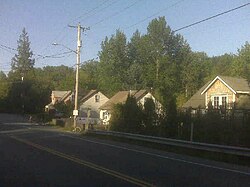Preston, Washington
Preston | |
|---|---|
 Typical houses in Preston, WA | |
| Country | United States |
| State | Washington |
| County | King |
| Elevation | 430 ft (130 m) |
| Time zone | UTC-8 (Pacific (PST)) |
| • Summer (DST) | UTC-7 (PDT) |
| ZIP codes | 98027 |
| Area code | 425 |
| GNIS feature ID | 1524632[1] |
Preston is a small unincorporated community and exurban community located 22 miles (35 km) east of Seattle in King County, Washington, United States. The community was named after railway official William T. Preston.[2]
Preston is a historic mill town on the northeast edge of the large Tiger Mountain State Forest, along Interstate 90. Preston, elevation 430 ft, is located within commuting distance of Seattle and Bellevue.
The local Raging River feeds into the Snoqualmie River at Fall City, and offers recreational activities like fly-fishing and swimming. Eastside Fire & Rescue has an all-volunteer fire station, Station 74, staffed by residents of Preston and nearby communities, which serves the Preston area.
The Preston Community Club is a volunteer organization that was created to unite and protect the historic Preston community by organizing town events, and acting as liaisons to local and state government. Several small stores have popped up as the area grows, such as the Preston General store, Indoor Garden & Lighting, Coffee Too!, Subway, and the Preston Post Office. Several larger companies have taken advantage of Preston's accessibility, such as bottled water company Talking Rain, SanMar, and Platt.

Surrounding locations
References
- ^ "Preston". Geographic Names Information System. United States Geological Survey, United States Department of the Interior.
- ^ Meany, Edmond S. (1923). Origin of Washington geographic names. Seattle: University of Washington Press. p. 231.

